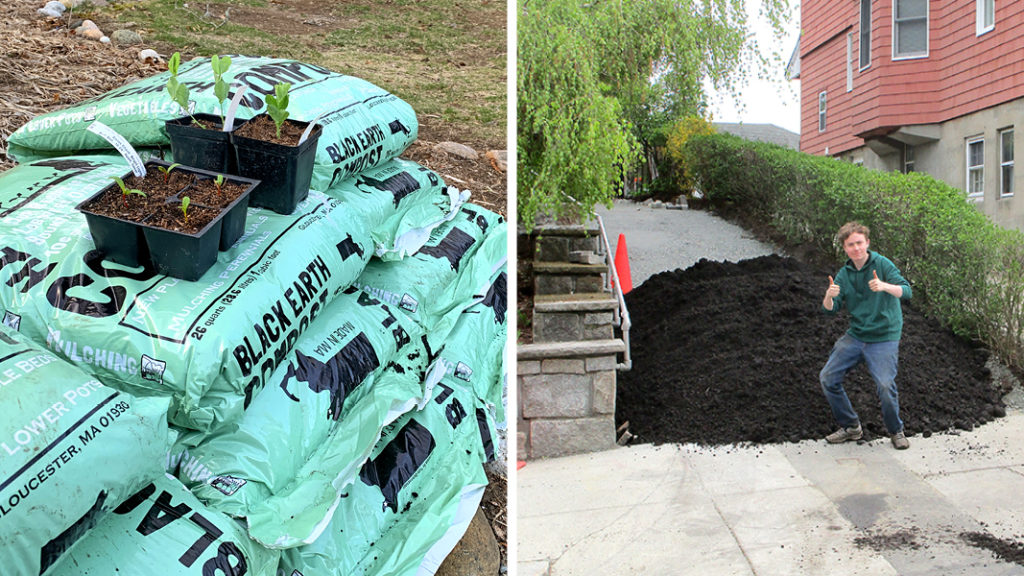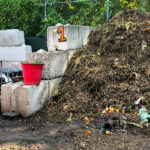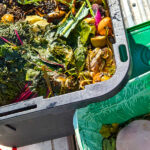Top: Conor Miller, founder of Black Earth Compost, with co-owners (from left to right) Justin Sandler, Andrew Brousseau and Sarah Wolfskehl.
Nora Goldstein
Around the country, in small towns and big cities, entrepreneurs are filling a void left by municipal governments by offering residents curbside collection of their food scraps. Some start with a fleet of bicycles equipped with trailers; others outfit a used pickup truck or van for collection. And very quickly, as BioCycle articles have documented for many years, these bootstrap companies evolve into full-fledged organics recycling services for collection — and in many cases composting — of residential, commercial and institutional food scraps.
Several weeks ago, I wrote about Compost Crew in Maryland, which most recently began marketing a small-scale composting system, Compost Outpost. Molly Lindsay’s 2020 article series in BioCycle, Lessons In Community Composting, explored the variety of business structures and collection and processing strategies that these entrepreneurs utilize. On a recent Northeast Recycling Council webinar, presenters covered a range of methods to provide households with access to food scraps recycling — Franklin County, Massachusetts’ (MA) utilization of drop-off sites, the City of Brattleboro, Vermont’s curbside collection program, and Manchester, MA-based Black Earth Compost’s residential subscription service.

Households purchase a 13-gallon cart and 2 rolls of certified compostable liner bags when they subscribe to the collection service.
Conor Miller, founder of Black Earth Compost, noted on the webinar that the ‘sweet spot’ for his company is when a town “gets behind one service provider as the preferred vendor for residential food scraps collection.” Miller noted that the day the Town of Newton (MA) designated Black Earth Compost as its preferred vendor, the mayor sent an email to about 20,000 households encouraging them to sign up for collection service. “Within a week, about 1,000 households signed up,” he said. “We’ve also been able to get support from Parent-Teacher Organizations at schools that we service, who help spread the word through their email networks.”
I spoke with Miller after the webinar to learn more about Black Earth Compost’s (BEC) experiences working with municipalities to provide residential access — and to get an update on the company overall. We had last touched base in 2015 when BioCycle arranged for BEC’s collection service for food scraps generated at BioCycle’s 15th Annual Conference on Renewable Energy From Organics Recycling that was held in Danvers (MA).
Optimizing Collection
Miller started the company in 2011 to fill a void he saw in the market for collection of food scraps from smaller restaurants and households. Collected organics were composted on land leased on a farm. Soon, Justin Sandler and Andrew Brousseau came on as partners. Today, BEC has over 20 collection and compost delivery trucks. Its service area extends to Cape Cod, as far west as Worcester (MA), Cape Ann on the North Shore, and includes the City of Boston and many towns in the greater metropolitan region. “We are dedicated to collecting food scraps from residents, schools, supermarkets, colleges, and more, all across eastern Massachusetts,” says Miller. “We are also the only vertically integrated company in the region that composts the material too, returning it to customers and selling it in garden centers across Massachusetts and southern New Hampshire.”

Commercial and institutional accounts use 32-, 48- and 64-gallon carts to set out source separated organics. Photos courtesy of Black Earth Compost.
All food scraps, soiled paper and pizza boxes, BPI-certified compostable products, and additional organic materials are accepted. Household purchase a 13-gallon Orbis wheeled cart and two rolls of certified compostable bags for $34; in some cases, towns provide the carts and a supply of BPI-certified compostable liners to residents at no charge. “It’s great to have towns get behind the program like that because it shows their commitment and encourages residents to participate,” he adds.
Residents must place food scraps in certified compostable bags, paper bags or wrapped in newspapers to keep the carts clean and prevent contents from freezing to the carts during the winter. Black Earth Compost also will pick up yard trimmings (no grass clippings allowed) for $3/bag. Recently the company introduced a 4-gallon pail for apartment dwellers. Commercial and institutional customers utilize 32-, 48- or 64-gallon carts.
Like many other food scraps haulers who service a range of generators, BEC saw a 90% drop in its commercial collection service in 2020 — and a dramatic increase in its residential collection accounts. “We jumped from 10,000 households to 20,000 households last year,” notes Miller. “And the amount of food scraps increased from 11 lbs/household/week before the COVID-19 pandemic to 13 lbs/household/week during COVID. In addition, compost sales skyrocketed and we repurposed trucks we had been using to service commercial and institutional accounts for compost deliveries!”
The fees charged per household decrease as more residents in the same town join the collection program. It takes 40 to 50 people in a town to sign up for service to start a route, and the price is $99 for 6 months, explains Miller. “If it grows to several hundred subscribers, the price drops to $69 for 6 months. If that number doubles, e.g., to 600, it drops to $49, depending on the size of the town. It isn’t necessary in some cases for towns to select BEC as their preferred vendor to get to a critical mass. But we are starting to see more towns create a preferred vendor program because the cost to offer their own residential curbside collection program is too high. And it doesn’t cost them anything to market a program that starts in their community. Having town support is always big in our book.”
Composting Operations
Food scraps are composted at the Town of Manchester’s yard trimming facility, which BEC manages, and more recently, at the Town of Groton’s yard trimmings facility, also managed by BEC. It accepts and processes the towns’ yard trimmings at no cost. “In Manchester, our operations are on 1.2 acres and we compost about 40 tons/week of food scraps,” says Brousseau. “Groton is on 3 acres and we have just started operating the facility and are at 40 tons/week of food scraps there.”
Food scraps are ground using an ALLU bucket before being blended with yard trimmings and put in aerated windrows. “Unfortunately we operate on compacted dirt at the Manchester facility, which is not ideal,” adds Brousseau. “We want to make upgrades to the site but have been waiting 3 years for the town to act on some grant funding. In Groton, we are unloading on a concrete surface and have brought in gravel to make a compacted pad for the initial windrows. This is ideal.”
Black Earth Compost is putting up a Big Top fabric structure at the Groton site with a concrete aeration floor where initial processing of incoming food scrap loads will take place. “We’ll bucket grind in the building and blow air through the material for a few days to better control the liquid and odors,” explains Miller. “This material will then be added to an existing aerated windrow.”
The active composting phase is 3 months, followed by 3 months of curing. “Pile height varies between 6 feet and 10 feet,” notes Brousseau. “Turning can be every other day or every week at the beginning, and then less frequently at the end of the active phase. Compost is screened and then can sit for another 1 to 4 months before being sold. At the Manchester site, aeration fans are solar-powered, and run only during active composting. We would rather be on grid power there to have uninterrupted power. At the Groton site, we are tied to the grid so can run larger blowers consistently.”
Black Earth Compost is a fan of certified compostable products, especially the liner bags. “We are a hauling company and a composting company and know for hauling, it is really important to allow compostable products for ease of collection and for ease of capturing more food scraps,” says Miller. “We then have to process those materials in a manner that breaks them down. In our case, that involves bucket grinding, and making sure, via frequent turning, that they get into the middle of the pile. It’s not always visually attractive during the composting process, but in the end, they do disintegrate.”
Tailings from the trommel screener are recycled back into the beginning of the composting process — “after we do a large amount of trash picking,” says Brousseau. “If you don’t pull the trash out then it keeps fragmenting and getting smaller until it does go through the screen and into your final product. The trash needs to, and will leave one way or another.”

Compost is sold in 1-cubic foot bags (left) and in bulk (right). Households in the food scraps collection program are offered a complimentary bag of compost each spring, which they can choose to donate.
Black Earth bags 25% of its compost, as well as sells compost and blends to garden centers and other customers in bulk. Households participating in the residential collection program receive a voucher for a 1-cubic foot bag of compost redeemable at participating garden centers. Subscribers who don’t want the compost can have their portion donated to Backyard Growers, which establishes vegetable gardens at homes, housing communities, organizations, and schools.














